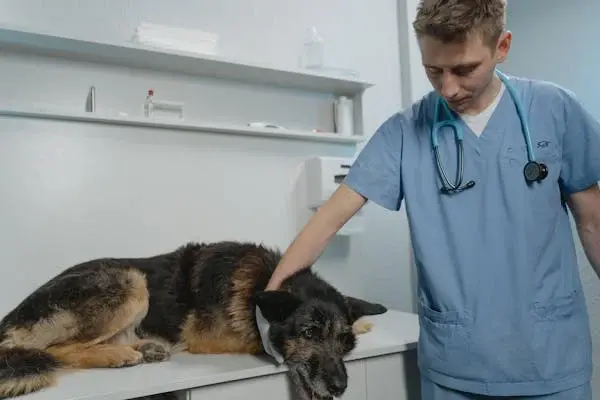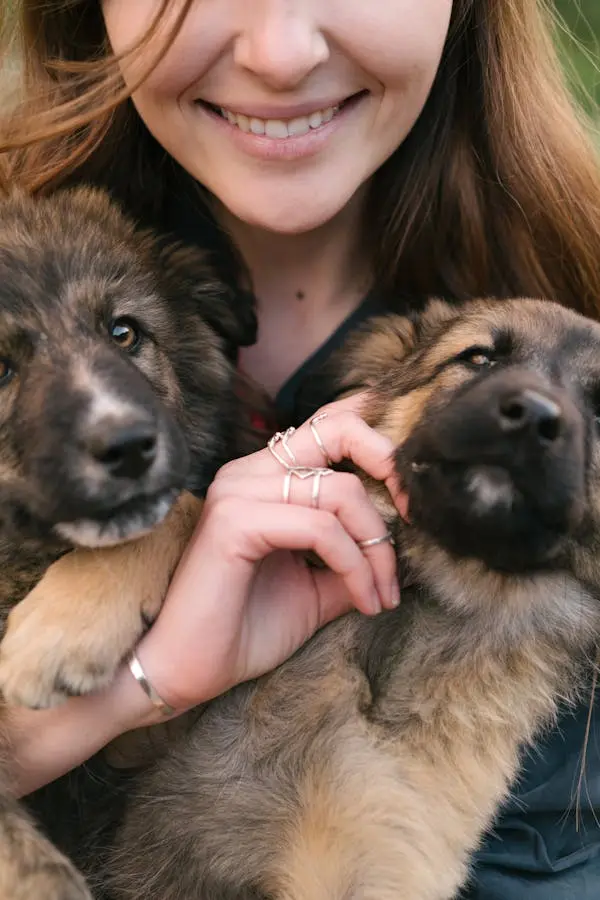When I was younger, I dreamed of having a devoted German Shepherd. Currently, with my wealth of experience with these impressive dogs, I’m ready to offer insight into their breeding. It’s more than just creating more puppies – it’s about nurturing and advancing this spectacular breed. So, bring your coffee, and join me in exploring the German Shepherd breeding universe.
Why German Shepherds? A Personal Perspective
Let’s dive right into why German Shepherds are simply remarkable, before we explore breeding aspects. My initial encounter with a German Shepherds on duty with the local police left a strong impression. Its intelligence, faithfulness, and commanding persona were extremely impressive. That was the moment I felt driven to help maintain this breed.
German Shepherds aren’t just pretty faces (though they are handsome devils). They’re:
- Intelligent and easy to train
- Loyal to a fault
- Versatile – from police work to therapy dogs
- Great with families (when properly socialized)
But breeding them? That’s a whole different ball game.
The Reality Check: Breeding Isn’t for Everyone
Look, I’m not going to sugarcoat it. Breeding German Shepherds is tough work. It’s not all fluffy puppies and wagging tails. Before you even think about breeding, ask yourself:
- Do I have the time and resources to care for multiple dogs?
- Can I handle the emotional roller coaster of breeding (trust me, there will be ups and downs)?
- Am I prepared to be responsible for every puppy I produce – for life?
If you answered “no” to any of these, you might want to reconsider. But if you’re still with me, let’s roll up our sleeves and get into the details.
Selecting Your Breeding Stock: It’s Not a Beauty Contest
At my journey’s onset, I assumed breeding was simply pairing the most aesthetic dogs. What a misunderstanding that was! Choosing breeding stock is akin to merging roles of a sleuth, a physician, and a dog coach in one.
Health Clearances: The Non-Negotiables

First things first – health clearances. These aren’t just fancy papers; they’re your blueprint for healthy puppies. Here’s what you need:
- Hip dysplasia screening (OFA or PennHIP)
- Elbow dysplasia evaluation
- Eye examination (CERF)
- DNA tests for genetic diseases like Degenerative Myelopathy
I learned this the hard way when one of my early litters had hip problems. Never again. Now, I won’t even consider a dog without these clearances.
Temperament: The Heart of a Good German Shepherd
A German Shepherd with a bad temperament is like a sports car with a faulty engine – looks good, but it’s a disaster waiting to happen. Look for dogs that are:
- Confident without being aggressive
- Good with kids and other animals (crucial for family pets)
- Eager to learn and please
I once worked with a gorgeous male who had the temperament of a grumpy bear. Needless to say, he didn’t make the cut for breeding.
Conformation: More Than Just Good Looks
Conformation isn’t about winning beauty pageants (though that’s nice too). It’s about ensuring the dog can do what it was bred to do. A good breeding German Shepherds should have:
- A strong, athletic build
- The right proportions (not those sloped backs you see in some show lines)
- A thick, weather-resistant coat
Remember, we’re breeding working dogs, not fashion models.
The Breeding Process: It’s All in the Timing

Alright, you’ve got your perfect pair. Now comes the tricky part – actually breeding them.
Timing is Everything
Female Breeding German Shepherds come into heat every 6-8 months. But here’s the kicker – they’re only fertile for a small window during that time. Get the timing wrong, and all your preparation goes out the window.
Pro tip: Use progesterone testing. It’s a game-changer. I used to rely on physical signs alone and had many missed breeding opportunities. Now, with progesterone testing, my success rate has skyrocketed.
Natural Breeding vs. Artificial Insemination
You’ve got options here:
- Natural breeding: Let nature take its course. It’s usually the easiest and most successful method.
- Artificial insemination: Useful for dogs that are geographically distant or have physical limitations.
I prefer natural breeding when possible. There’s something about letting dogs do what comes naturally that just feels right.
Pregnancy and Whelping: The Waiting Game
Congratulations! Your female is pregnant. Now the real work begins.
Pregnancy Care: Pampering Your Expectant Mother
For the next 63 days (give or take), your female needs special care:
- High-quality nutrition (puppy food works great)
- Moderate exercise (no marathons, but don’t let her become a couch potato)
- Regular vet check-ups (I schedule them every two weeks)
Preparing for D-Day (Delivery Day)
As the big day approaches, you need to be ready:
- Set up a quiet, comfortable whelping area
- Gather supplies: whelping box, heating pad, towels, dental floss (for tying off umbilical cords), scissors, etc.
- Have your vet’s emergency number on speed dial
Trust me, you don’t want to be running around looking for supplies when your dog goes into labor at 2 AM (been there, done that).
The Miracle of Birth
Watching German Shepherd puppies being born never gets old. But it’s not always smooth sailing. Be prepared for:
- Long labor (up to 24 hours is normal)
- Puppies born in sacs that need to be opened
- The occasional pup that needs help getting started
I once had a female who decided to give birth in the middle of a thunderstorm. Let’s just say it was a night to remember!
Raising Puppies: The Real Adventure Begins
Congratulations! You’re now the proud grandparent of a litter of German Shepherd puppies. But the work is far from over.
The First Few Weeks: Round-the-Clock Care
For the first two weeks, your job is simple but exhausting:
- Keep the puppies warm
- Make sure they’re nursing regularly
- Help mom keep the whelping area clean
I set up a baby monitor in my whelping area. It’s a lifesaver for those middle-of-the-night checks.
Weaning and Socialization: Shaping Future Personalities
From weeks 3-8, you’re not just feeding puppies; you’re shaping future companions:
- Start introducing solid food around week 3
- Begin socialization: expose puppies to different sounds, textures, and experiences
- Start basic training: even 5-week-old puppies can learn simple commands
I like to set up a “puppy playground” with different textures, small obstacles, and toys. It’s amazing to watch their confidence grow.
Health Care: Keeping Your Puppies Thriving
Don’t forget the health basics:
- Deworming starts at 2 weeks and continues every 2 weeks
- First vaccinations around 6-8 weeks
- Regular vet check-ups to catch any issues early
I keep a detailed health record for each puppy. It’s a bit of work, but new owners really appreciate it.
Finding the Right Homes: The Hardest Part of Breeding

This is where the rubber meets the road. Finding the perfect home for each puppy is crucial and often heartbreaking.
Screening Potential Owners
I have a rigorous screening process:
- Detailed application form
- Phone interview
- Home visit (when possible)
- Contract that includes a spay/neuter agreement and first right of refusal if they can’t keep the dog
It might seem like overkill, but I’ve never regretted being too careful.
Saying Goodbye: The Bittersweet Moment
Letting go of puppies you’ve raised from birth is tough. I won’t lie – I’ve shed tears every single time. But seeing them go to loving homes makes it all worthwhile.
The Business Side: Yes, There’s Paperwork
Breeding isn’t just about dogs; there’s a business side too:
- Check local regulations: you might need a kennel license
- Keep meticulous records: breeding dates, health clearances, puppy sales
- Consider insurance: it can be a lifesaver if something goes wrong
I use a specialized breeding software to keep track of everything. It’s been a game-changer for staying organized.
Continuous Learning: The Key to Success
The world of dog breeding is always evolving. Stay on top of:
- New genetic tests
- Advances in canine nutrition
- Changes in breed standards
I attend at least one breeding seminar every year. It’s a great way to network and learn from other breeders.
Conclusion: A Labor of Love
Breeding German Shepherds isn’t a quick money-making idea. It demands commitment, wisdom, and heart in bundles. Seeing your pups become incredible pets and working dogs makes it valuable. Keep in mind, every German Shepherd you raise is a lifelong responsibility.
Prepared for that dedication? If yes, enter the enchanting realm of German Shepherd raising. A memorable adventure awaits.


